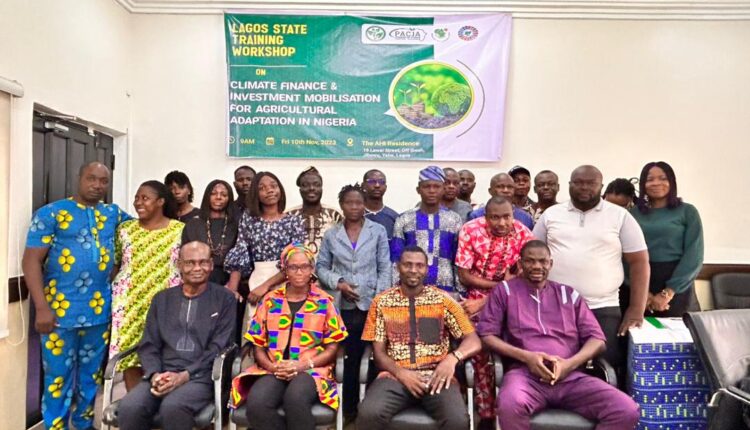
The Climate and Sustainable Development Network (CSDevNet) organised a one-day training workshop on climate finance and investment mobilization for agricultural adaptation in Nigeria at the Ahi Residence in Jibowu, Lagos.
The workshop brought together over 30 civil society, community representatives, women, young people, and the media among others, with the discussions centering on the need for them to work collaboratively towards ensuring climate finance mobilization, and enhancement of the capacity of Nigerian Journalists to tell more effective climate-related stories through a more gender-sensitive lens.
The broader objectives of the training was to train relevant stakeholders on climate finance mobilization; Promote transparency in the mobilisation and utilisation of Adaptation Finance; and Train media personnel to tell more effective climate-related stories through a gender-sensitive lens.
The meeting provided the opportunity for participants to learn and understand climate finance and the impacts of climate change on the agricultural sector such as water scarcity, increase in demand for food and forceful migration, among others.
In the course of the training, the following were observed:
- There is a huge disconnect between climate policies and initiatives at the federal level in Nigeria and what is obtains in local communities where the impacts of climate change are felt the most.
- Despite the availability of huge financial resources for climate adaptation, these resources are not channeled to agricultural adaptation in Nigeria and Africa.
- Climate Change is happening faster than previously anticipated and agriculture is vulnerable on a global scale but most especially in Nigeria and across Africa
- Climate risk reduction strategies and early warning systems at the national level have improved significantly but do not have trickle-down effect to the farmers and vulnerable communities that need such information to determine their actions
- There is divergence of views on climate change adaptation among civil society and the journalists who report the situation on ground. These impact the quality of stories published on the subject matter
- The mammoth investment opportunities needed to make Nigeria’s agricultural sector resilient are largely untapped because of lacking synergy and financial support across sectors.
- Climate change impacts vary for men and women. Unfortunately, the vulnerabilities of women are largely ignored and they are equally excluded in the discussions and decision-making processes.
- There are pockets of adaptation practices and initiatives in different localities but they are not getting the requisite support from the federal and state levels
- Successful climate adaptation strategies and initiatives at the grassroots levels across Nigeria are not adequately reported or spotlighted in the media due to capacity issues on the part of journalists
Participants therefore recommended the following:
- Need for government agencies and ministries involved in climate change policies to synergize efforts with states and local governments. Autonomy of local governments is key to ensuring trickledown effect at the grassroots
- Removal of impediments that local farmers face in their quest to access investment opportunities needed to make Nigeria’s agricultural sector resilient
- Need for prioritization of agriculture and the role of farmers in climate adaptation plans and policies of the government
- Need for sustained engagement between civil society and the media through workshops and trainings for harmony of views on climate change adaptation which will impact on the quality of stories published on the subject matter
- Need for amplification of climate change impacts in a balanced manner that addresses and gives prominence to the varying impacts of climate change on both men and women. Women must also be part of decision-making processes and impediments to their inclusion removed
- Need for recognition and amplification of success stories of climate change adaptation initiatives at the grassroots levels. Such initiatives should also be adequately spotlighted in media reports
- Need for capacity building trainings of journalists on reporting climate change with particular emphasis on climate adaptation
